SAVE MONEY ON TRANSPORTATION
The average cost of owning and driving a car 15,000 miles a year is $8,121 according to AAA.

Profit and prosper with the best of Kiplinger's advice on investing, taxes, retirement, personal finance and much more. Delivered daily. Enter your email in the box and click Sign Me Up.
You are now subscribed
Your newsletter sign-up was successful
Want to add more newsletters?

Delivered daily
Kiplinger Today
Profit and prosper with the best of Kiplinger's advice on investing, taxes, retirement, personal finance and much more delivered daily. Smart money moves start here.

Sent five days a week
Kiplinger A Step Ahead
Get practical help to make better financial decisions in your everyday life, from spending to savings on top deals.

Delivered daily
Kiplinger Closing Bell
Get today's biggest financial and investing headlines delivered to your inbox every day the U.S. stock market is open.

Sent twice a week
Kiplinger Adviser Intel
Financial pros across the country share best practices and fresh tactics to preserve and grow your wealth.

Delivered weekly
Kiplinger Tax Tips
Trim your federal and state tax bills with practical tax-planning and tax-cutting strategies.

Sent twice a week
Kiplinger Retirement Tips
Your twice-a-week guide to planning and enjoying a financially secure and richly rewarding retirement

Sent bimonthly.
Kiplinger Adviser Angle
Insights for advisers, wealth managers and other financial professionals.

Sent twice a week
Kiplinger Investing Weekly
Your twice-a-week roundup of promising stocks, funds, companies and industries you should consider, ones you should avoid, and why.

Sent weekly for six weeks
Kiplinger Invest for Retirement
Your step-by-step six-part series on how to invest for retirement, from devising a successful strategy to exactly which investments to choose.
The average cost of owning and driving a car 15,000 miles a year is $8,121 according to AAA. SUVs are even more costly, at $10,448 per year. That includes all costs of ownership, such as gas, insurance, maintenance, registration, taxes depreciation, financing and more. Yikes.
No doubt getting around can be a huge budget buster. Here are ten tips to help cut your costs:

BUY A USED CAR
Because cars lose most of their value in the first few years, buying used allows you to drive a vehicle you probably couldn't afford brand new.
Recent used models -- those that are less than five years old -- can be a real value because you get a nearly new car still in fine working order for a fraction of the new-car price. And you'll pay less for collision insurance and taxes, too. Learn more about how to shop smart.
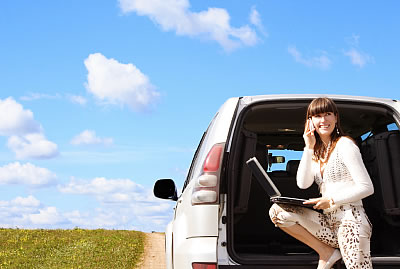
BUY A SIPPER, NOT A GUZZLER
You don't need a hybrid vehicle to save money on gas -- higher purchase prices can cancel out any savings. But a regular car with good gas mileage could save you hundreds of dollars a year on fuel.
Drive 1,200 miles per month in a car that averages 18 miles per gallon, and you'll spend $233 per month (at $3.50 per gallon). Drive a car that averages 25 miles per gallon, and you'll spend $168 per month -- a savings of $65 per month, or $780 per year. Find out which gas-sipping cars are worth a look.
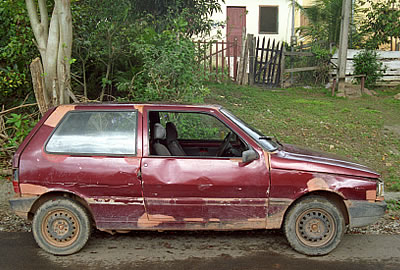
RE-SHOP YOUR CAR INSURANCE
Using a comparison site like InsWeb.com can help you determine if you've got the best deal. Rates vary widely from insurer to insurer. Your savings could equal hundreds of dollars.
Shopping around is especially important for young adults because their rates could drop as they approach age 25 or older, build a credit rating, start a career and get married. Insurers reward customers who are responsible.
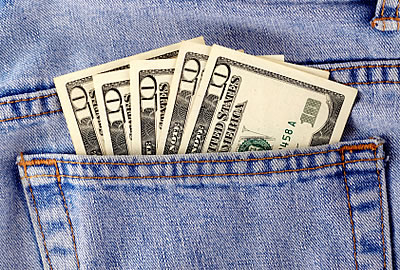

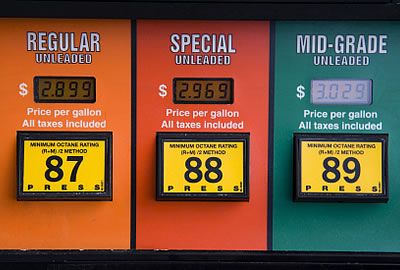
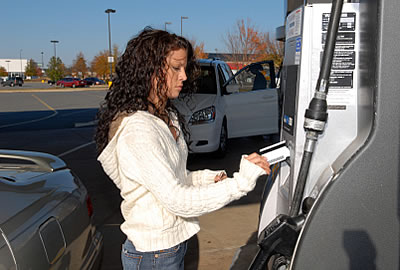
SHOP AROUND FOR GAS
Gas prices can vary as much as 20% within only a few blocks, according to GasBuddy.com, a price-monitoring site. So hop online to find the best deal in your neighborhood or along your commute route.
A 20-cent difference on 60 gallons of gas per month adds up to $12 per month or $144 per year.

USE A GAS REBATE CREDIT CARD
If you frequent the pump, soften the financial sting with a credit card that'll give you cash back for filling up.
For example, the Discover Open Road card gives you 5% cash back on gas and auto maintenance charges up to $100 per month. That saves you about $60 per year. Plus you get a rebate of up to 1% on all other purchases.

HOP ON THE BUS, GUS
Public transportation can save you a bundle on commuting costs because you won't have to spend money on a parking space, gas and auto maintenance. Plus, you can probably get a lower insurance rate for driving less.
Ask if your employer will pick up part of the tab for your public transportation costs. If not, suggest the company look into the matter -- it could qualify for a tax break.


Profit and prosper with the best of Kiplinger's advice on investing, taxes, retirement, personal finance and much more. Delivered daily. Enter your email in the box and click Sign Me Up.
-
 Over 65? Here's What the New $6K 'Senior Deduction' Means for Medicare IRMAA Costs
Over 65? Here's What the New $6K 'Senior Deduction' Means for Medicare IRMAA CostsTax Breaks A new deduction for people over age 65 has some thinking about Medicare premiums and MAGI strategy.
-
 U.S. Congress to End Emergency Tax Bill Over $6,000 Senior Deduction and Tip, Overtime Tax Breaks in D.C.
U.S. Congress to End Emergency Tax Bill Over $6,000 Senior Deduction and Tip, Overtime Tax Breaks in D.C.Tax Law Here's how taxpayers can amend their already-filed income tax returns amid a potentially looming legal battle on Capitol Hill.
-
 5 Investing Rules You Can Steal From Millennials
5 Investing Rules You Can Steal From MillennialsMillennials are reshaping the investing landscape. See how the tech-savvy generation is approaching capital markets – and the strategies you can take from them.
-
 10 Things You Should Know About Buying a Car Today, Even if You've Bought Before
10 Things You Should Know About Buying a Car Today, Even if You've Bought BeforeIf buying a car is on your to-do list, and it's been a while since you went shopping for a new one, this guide will help avoid any nasty shocks in the showroom.
-
 Get the Best Car Deal in Retirement: Here's the Trick
Get the Best Car Deal in Retirement: Here's the TrickPlanning on shopping for a new car this Labor Day weekend? Here’s how to haggle for a better price, even though you're retired.
-
 What to Do With Your Tax Refund: 6 Ways to Bring Growth
What to Do With Your Tax Refund: 6 Ways to Bring GrowthUse your 2024 tax refund to boost short-term or long-term financial goals by putting it in one of these six places.
-
 What Does Medicare Not Cover? Eight Things You Should Know
What Does Medicare Not Cover? Eight Things You Should KnowMedicare Part A and Part B leave gaps in your healthcare coverage. But Medicare Advantage has problems, too.
-
 15 Reasons You'll Regret an RV in Retirement
15 Reasons You'll Regret an RV in RetirementMaking Your Money Last Here's why you might regret an RV in retirement. RV-savvy retirees talk about the downsides of spending retirement in a motorhome, travel trailer, fifth wheel, or other recreational vehicle.
-
 The Six Best Places to Retire in New England
The Six Best Places to Retire in New Englandplaces to live Thinking about a move to New England for retirement? Here are the best places to land for quality of life, affordability and other criteria.
-
 The 10 Cheapest Countries to Visit
The 10 Cheapest Countries to VisitWe find the 10 cheapest countries to visit around the world. Forget inflation and set your sights on your next vacation.
-
 15 Ways to Prepare Your Home for Winter
15 Ways to Prepare Your Home for Winterhome There are many ways to prepare your home for winter, which will help keep you safe and warm and save on housing and utility costs.
